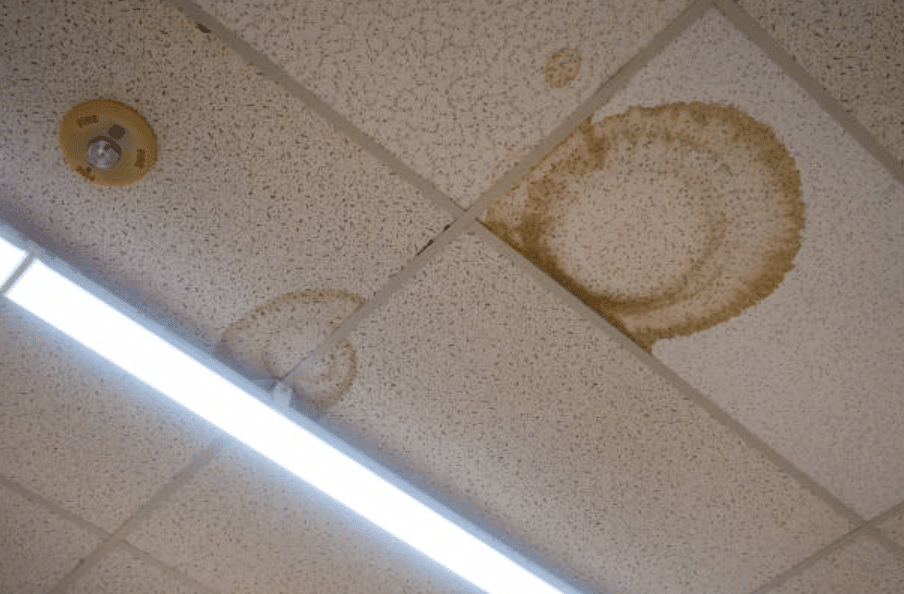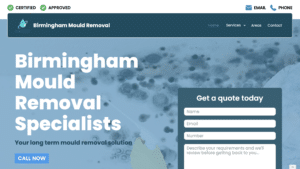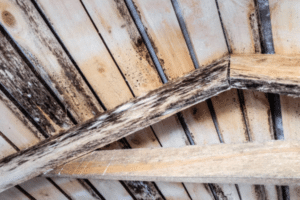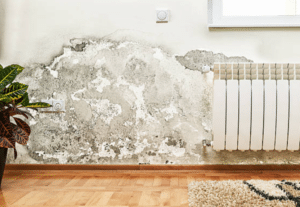In this article, we’ll look into how creating mould free commercial workspaces is crucial for ensuring the health and productivity of employees in buildings.
Mould growth can pose serious health risks and result in productivity losses. Professional mould remediation is essential for safe and effective removal.
The mould remediation process involves containment, removal, treatment, and prevention measures. Prevention techniques include proper ventilation, moisture control, and regular inspections. DIY mould removal is not recommended due to the risks of incomplete remediation and health hazards.
Hiring a professional mould remediation service is the best course of action to ensure thorough and safe removal of mould. Regular inspections and maintenance are important to prevent mould growth.
Mould in commercial buildings can lead to respiratory issues and allergies in employees, affecting productivity. Air quality in commercial buildings should be maintained by preventing mould growth and ensuring cleanliness.
Following these steps, including staying on top of water damage, maintaining the HVAC system, investing in air purification, and implementing a regular cleaning schedule, can help create a clean and mould-free workspace for employees.
Key Takeaways:
- Mould growth can pose serious health risks and result in productivity losses in commercial buildings.
- Hiring a professional mould remediation service is essential for safe and effective removal.
- Prevention techniques such as proper ventilation, moisture control, and regular inspections are crucial for maintaining a mould-free workspace.
- DIY mould removal is not recommended due to the risks of incomplete remediation and health hazards.
- Regular inspections, maintenance, and investing in air purification can prevent mould growth and ensure a clean workspace for employees.
Statistics on mould in commercial buildings in the UK
According to a study by the Building Research Establishment found that around 20% of commercial buildings in the UK have a mould problem.
In a study by the Health and Safety Executive found that exposure to mould in the workplace can lead to a variety of health problems, including respiratory infections, allergies, and asthma.
The study by the Chartered Institute of Building found that mould can cause significant damage to buildings and furnishings.
The Importance of Professional Mould Remediation
Professional mould remediation is essential for safe and effective removal of mould in commercial buildings. When it comes to dealing with mould growth, hiring a mould removal service is the best course of action.
These experts have the knowledge and experience to properly assess the situation, identify the source of the mould, and implement the necessary steps for efficient removal.
The mould remediation process typically involves several important stages. First, mould experts will contain the affected area to prevent the spread of mould spores. This is crucial to minimise the risk of cross-contamination and ensure the safety of both the workers and the occupants of the building.
Once containment is established, the professionals will proceed with the removal of the mould. They have specialised tools and equipment to safely extract the mould and dispose of it properly.
After the removal process, the experts will treat the affected area to eliminate any remaining mould spores and prevent future growth. They will also provide recommendations for preventing mould recurrence, such as improving ventilation and addressing any moisture issues.
By relying on the expertise of mould specialists, you can be confident that the mould removal process is done thoroughly and effectively, reducing the chances of mould-related health issues and ensuring a safe and healthy environment for everyone.
| Benefits of Professional Mould Remediation |
|---|
| Expert assessment and identification of the source of mould |
| Proper containment and safe removal of mould |
| Treatment to eliminate remaining mould spores |
| Recommendations for preventing mould recurrence |
Quote:
“Professional mould remediation is crucial for the health and safety of those working in commercial buildings. By entrusting the task to mould removal experts, you can ensure that the mould is effectively removed and the risk of future growth is minimised. It’s a small investment that can have a significant impact on the well-being and productivity of your employees.”
Don’t underestimate the importance of professional mould remediation when faced with mould issues in your commercial building.
While it may be tempting to try DIY methods, the risks are not worth it. DIY mould removal can lead to incomplete remediation, leaving behind hidden mould colonies that can cause further damage and health problems.
Furthermore, there are potential health hazards associated with handling mould without proper protective equipment and training.
By calling in a professional mould remediation service, you can trust that the job will be done right the first time. They have the expertise and tools to ensure that all traces of mould are removed, reducing the risk of recurrence.
Protect the health of your employees and maintain a safe working environment by leaving the task of mould removal to the experts.
| The Risks of DIY Mould Removal |
|---|
| Incomplete remediation |
| Potential health hazards |
| Hidden mould colonies |
| Lack of proper protective equipment and training |
Prevention Techniques for Mould Free Commercial Workspaces
Implementing prevention techniques is key to creating and maintaining a mould-free workspace in commercial buildings.
By taking proactive measures, you can prevent mould growth and ensure a healthy environment for your employees.
Here are some mould-free workspace solutions and techniques:
- Proper ventilation: Good airflow is essential for preventing excess moisture, which is a common cause of mould growth. Ensure that your workspace has adequate ventilation systems in place. Regularly check and clean ventilation ducts to keep the air circulating effectively.
- Moisture control: Moisture is the main culprit behind mould growth. Regularly inspect your workspace for any water leaks, condensation issues, or high humidity areas. Address these problems promptly and fix any sources of moisture to prevent mould from taking hold.
- Regular inspections: Conduct routine inspections of your commercial building to identify any potential mould issues. Inspect areas prone to moisture, such as bathrooms, kitchens, and basements. Look out for signs of water damage, musty odours, or visible mould growth. Early detection can help prevent further spread and minimise the need for extensive remediation.
- Mould-resistant materials: When renovating or building a commercial space, consider using mould-resistant materials. These materials are designed to inhibit mould growth and can be particularly beneficial in areas susceptible to moisture, such as bathrooms and kitchens.
“Prevention is better than cure.”
By taking proactive steps to prevent mould growth, you can save your business time, money, and potential health problems. Investing in professional mould remediation services and following these prevention techniques will create a mould-free workspace for your employees, promoting their health and productivity.
Regular Cleaning and Maintenance
In addition to the above techniques, maintaining cleanliness is crucial in preventing mould. Implement a regular cleaning schedule for your workspace, focusing on areas that are prone to moisture or have a history of mould growth. Wipe down surfaces, vacuum carpets, and remove any visible mould promptly.
Investing in air purification systems can also help improve the air quality in your commercial building. These systems filter out airborne mould spores and other pollutants, ensuring a healthier workspace for your employees.
| Prevention Techniques | Benefits |
|---|---|
| Proper ventilation | Reduces excess moisture and improves air circulation |
| Moisture control | Prevents the growth of mould by addressing sources of moisture |
| Regular inspections | Early detection of mould issues and prompt remediation |
| Mould-resistant materials | Inhibits mould growth in susceptible areas |
By incorporating these prevention techniques into your commercial building maintenance plan, you can create a mould-free workspace that promotes a healthy and productive environment for your employees.
The Risks of DIY Mould Removal
DIY mould removal is not recommended due to the risks of incomplete remediation and potential health hazards. Mould growth can be a complex issue that requires professional expertise to address effectively.
Without proper knowledge and equipment, DIY efforts are likely to fall short, leaving behind hidden mould and putting your health at risk.
When attempting DIY mould removal, there is a high chance of incomplete remediation. Mould spores can easily spread during the removal process, contaminating other areas of your commercial building. This can lead to recurring mould issues and further damage to your property.
In addition to incomplete remediation, DIY mould removal can pose serious health hazards. Disturbing mould colonies without the appropriate protective gear can release mould spores into the air, which can be inhaled and cause respiratory issues, allergies, and other health problems. Protecting yourself and your employees from these health risks should be a top priority.
To ensure safe and thorough mould removal, it is recommended to hire a professional mould cleaning service in London.
Professionals have the knowledge, experience, and equipment to effectively contain the affected areas, remove mould colonies, treat the affected surfaces, and take preventive measures to prevent future mould growth.
When it comes to mould removal, it’s best to leave it to the experts. By investing in professional mould cleaning services, you can mitigate the risks associated with DIY attempts and ensure a safe and mould-free environment for your employees.
Regular Inspections and Maintenance for Mould Prevention
Regular inspections and proactive maintenance are vital for preventing mould growth in commercial buildings. By implementing these essential practices, you can ensure a safe and healthy work environment for your employees. Mould, if left unchecked, can lead to respiratory issues and allergies, which can have a negative impact on employee productivity and overall well-being.
To effectively prevent mould growth, it is crucial to address any potential issues early on. Regular inspections allow you to identify areas of concern before they develop into larger problems. This proactive approach enables you to take timely action, minimising the risk of mould infestation and subsequent health hazards.
In addition to inspections, maintenance plays a key role in mould prevention. Promptly addressing any water damage, such as leaks or floods, is essential. Moisture control is vital in preventing mould growth, as mould thrives in damp conditions.
Regularly checking and maintaining the HVAC system is also important, as it can contribute to the spread of mould if not properly maintained.
Investing in air purification systems can further enhance the quality of the workspace environment. These systems help remove airborne mould spores, ensuring a cleaner and healthier atmosphere for your employees.
Implementing a regular cleaning schedule, including thorough cleaning of ventilation systems, can also help maintain a mould-free workspace.
| Mould Prevention Tips: |
|---|
| 1. Conduct regular inspections to identify potential mould issues. |
| 2. Address water damage promptly and efficiently. |
| 3. Ensure proper moisture control in the workspace. |
| 4. Maintain the HVAC system to prevent the spread of mould. |
| 5. Invest in air purification systems to improve air quality. |
| 6. Implement a regular cleaning schedule, including ventilation systems. |
By following these preventive measures, you can create a clean and mould-free workspace, promoting the health and productivity of your employees. Prioritising regular inspections and proactive maintenance will not only prevent potential health risks but also contribute to a positive work environment.
The Impact of Mould on Employee Health and Productivity
Mould in commercial buildings can have a detrimental impact on employee health and productivity. The presence of mould can lead to respiratory issues, allergies, and other health problems among employees. This can result in increased sick leave, decreased productivity, and overall reduced work performance.
According to studies, poor indoor air quality, including mould contamination, has been linked to various health issues such as coughing, wheezing, and eye and throat irritation.
Prolonged exposure to mould spores can worsen respiratory conditions, especially in individuals with pre-existing allergies or asthma.
To ensure a mould-free work environment and safeguard the health of employees, it is crucial for commercial buildings to prioritise prevention and maintenance. Regular inspections, prompt water damage repairs, and proper ventilation are essential steps in preventing mould growth.
Implementing measures such as investing in air purification systems and adhering to a regular cleaning schedule can further promote a clean and healthy workspace.
| Steps to Maintain a Mould-Free Work Environment |
|---|
| 1. Conduct regular inspections to identify any signs of mould growth or water damage. |
| 2. Address any water damage promptly to prevent mould from thriving. |
| 3. Ensure proper ventilation to reduce moisture levels, as mould thrives in damp environments. |
| 4. Invest in air purification systems to improve indoor air quality and remove mould spores. |
| 5. Implement a regular cleaning schedule to keep the workspace clean and free from debris that can contribute to mould growth. |
By taking these preventive measures, commercial buildings can create a healthy work environment that promotes employee well-being and productivity.
The investment in maintaining a mould-free workspace is not only essential for the health of employees but also for the overall success and efficiency of the business.
Maintaining Clean and Mould-Free Workspaces
By following these steps, including investing in air purification and maintaining a regular cleaning schedule, you can create a clean and mould-free workspace for your employees.
Adequate air purification is essential for maintaining a healthy indoor environment. Installing air purifiers can help filter out pollutants, including mould spores, ensuring that the air your employees breathe is clean and free from harmful contaminants.
In addition to air purification, implementing a regular cleaning schedule is crucial for preventing mould growth.
Regularly cleaning and disinfecting surfaces, especially high-moisture areas such as bathrooms and kitchens, can help eliminate mould spores that may have settled. Remember to use appropriate cleaning products that are specifically designed to combat mould and mildew.
Proper moisture control is also essential in maintaining a mould-free workspace. Be vigilant in identifying and addressing any sources of moisture, such as leaks or condensation. Regularly inspect areas prone to moisture accumulation, such as basements or areas near plumbing fixtures, and promptly address any issues to prevent mould growth.
Importance of Professional Mould Remediation
“Professional mould remediation services are essential for safe and effective mould removal. They have the expertise and equipment to properly contain and remove mould, preventing its spread to other areas of your commercial building. Additionally, professional mould remediation companies use specialised treatments to ensure that the mould does not return. Attempting to remove mould yourself can lead to incomplete remediation and pose health hazards to you and your employees.”
Regular inspections are an integral part of mould prevention. Conduct thorough inspections at least once a year to identify any signs of water damage, leaks, or areas of high humidity.
Addressing these issues promptly can prevent mould growth before it becomes a more significant problem. It is also important to regularly maintain your HVAC system to ensure proper air circulation, which can help prevent moisture buildup and the subsequent growth of mould.
| Key Points | Benefits |
|---|---|
| Investing in air purification | Filters out mould spores and other pollutants |
| Maintaining a regular cleaning schedule | Eliminates settled mould spores and prevents growth |
| Controlling moisture | Prevents mould growth by addressing sources of moisture |
| Hiring professional mould remediation services | Ensures safe and effective mould removal |
| Regular inspections and maintenance | Identify and address any issues before they lead to mould growth |
Conclusion
Creating a mould-free workspace is essential for the health and productivity of your employees. By following the best practices discussed in this article and prioritising professional mould remediation, you can ensure a safe and productive work environment in your commercial building.
Mould growth in commercial buildings can pose serious health risks, leading to respiratory issues and allergies among employees. It can also result in productivity losses due to increased sick leave and decreased focus and motivation. To address this problem effectively, it is crucial to hire a professional mould remediation service.
Professional mould remediation involves a comprehensive process that includes containment, removal, treatment, and prevention measures. This approach ensures the thorough and safe removal of mould, minimising the risks of incomplete remediation and health hazards associated with DIY mould removal.
To prevent mould growth and maintain a mould-free workspace, it is important to implement prevention techniques. This includes proper ventilation to control moisture levels, regular inspections to identify potential mould issues early on, and prompt addressing of any water damage.
Additionally, investing in air purification systems and following a regular cleaning schedule are key in maintaining a clean and healthy work environment.
By taking these steps, you can create a clean and mould-free workspace for your employees, promoting their well-being and productivity. Prioritise the health of your staff and seek professional guidance when dealing with mould issues in your commercial building.
FAQ
Q: Why is creating a mould-free workspace important?
A: Creating a mould-free workspace is crucial for ensuring the health and productivity of employees in commercial buildings. Mould growth can pose serious health risks and result in productivity losses.
Q: What is the process of professional mould remediation?
A: Professional mould remediation involves containment, removal, treatment, and prevention measures. It is essential for safe and effective mould removal.
Q: Can I remove mould myself?
A: DIY mould removal is not recommended due to the risks of incomplete remediation and health hazards. It is best to hire a professional mould remediation service for thorough and safe mould removal.
Q: How can I prevent mould growth in my workspace?
A: Prevention techniques include proper ventilation, moisture control, and regular inspections. Proactive measures are important for maintaining a mould-free work environment.
Q: What are the risks of DIY mould removal?
A: DIY mould removal can result in incomplete remediation and health hazards. It is best to seek professional mould removal services for safe and thorough removal.
Q: Why are regular inspections and maintenance important for mould prevention?
A: Regular inspections and maintenance help identify potential mould issues early on and address any water damage promptly. They play a vital role in preventing mould growth.
Q: How does mould impact employee health and productivity?
A: Mould can lead to respiratory issues and allergies in employees, affecting their well-being and productivity. Maintaining a clean and mould-free work environment is crucial.
Q: How can I maintain a clean and mould-free workspace?
A: You can maintain a clean and mould-free workspace by investing in air purification systems, implementing a regular cleaning schedule, and following prevention techniques such as proper ventilation and moisture control.
Mould can be a serious health hazard, especially in commercial buildings where people spend a lot of time. If you have mould in your workplace, it’s important to take action immediately, but never attempt to remove mould yourself.
Instead, call a professional mould remediation company. Call us today at 0203 130 4068 for a free consultation.




